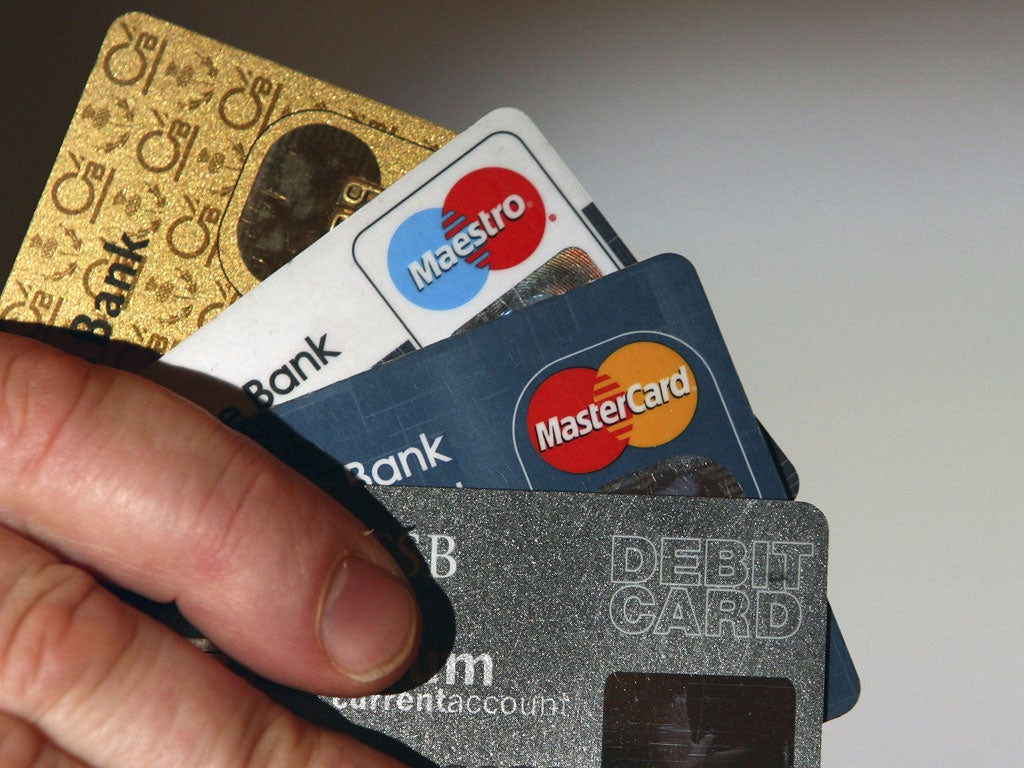Crackdown on the great credit card fees rip-off

Air fares, train tickets, concerts and car insurance will soon be cheaper as the Government cracks down on excessive credit card surcharges.
The hidden levy on goods and services bought by credit and debit cards, which can add £8 to the price of a plane ticket or 75p to the cost of cinema admission, is a recurring complaint among consumers. As anyone who buys holidays or concert tickets online will know to their cost, the surcharge is often only loaded on to the purchase price after customers have clicked through a succession of web payment pages.
Today the Government will announce steps to tackle the practice of adding a last-minute levy far above the actual cost to the retailer of processing a card payment, which can be as little as 10p.
Ministers will promise to stamp out surcharges that are "opaque, misleading and prevent consumers getting a good deal" by the end of next year.
Under the plans, "excessive surcharges" will be outlawed across the retail sector and retailers will be required to inform their customers in advance what extra charge they could face.
Mark Hoban, the Financial Secretary to the Treasury, said: "We want consumers to be able to shop around. They have a right to understand the charges they may incur up front and not be hit through a hidden last-minute payment surcharge."
He said Britain would become the first country to implement European Union legislation ending hidden surcharges. "The Government remains committed to helping consumers get a good deal in these difficult times," he said.
There will be fears that retailers may increase the cost of goods to make up for the lost fees, but ministers reply that the move will bring greater transparency to pricing and encourage competition. The plan comes after the consumer group Which? complained to the Office of Fair Trading (OFT) about the extra charges levied on transport, notably the cost of air travel.
Ryanair passengers face a £6 charge per person per flight for paying by debit or credit card, while easyJet charges £8 per booking and Flybe charges £4.50 per person per flight.
After an investigation, the OFT said it had uncovered considerable evidence of surcharging which it viewed as misleading. It called for hefty surcharges for processing debit cards to be outlawed. However, the Government will go further and announce that it supports the ban to be extended to all forms of card payment and for all retail sectors, including transport.
The OFT found that consumers who booked air tickets online in 2009 had to spend £300m on surcharges.
It remains unclear, however, how the new measures will affect a Ryanair scheme to drive customers into using only its own pre-payment card to avoid the £6 administration fee when booking tickets. The airline charges £6 to get the card and a further £2.50 fee if it is not used within six months. Further fees could build up if the account goes into overdraft through the application of the £2.50 charge.
The Treasury will publish a consultation document in the new year setting out its plans for tackling surcharges. The aim is for the rules to come into force by the end of next year – in time for Christmas 2012.
Richard Lloyd, the executive director of Which?, said he was delighted to see "an end to these unfair and excessive charges". He added: "The Government's decision to ban 'rip-off' debit and credit card surcharges is a huge victory for consumers. Given that airline passengers alone pay more than £265,000 a day in card surcharges, businesses shouldn't drag their feet. While the law will come into force at the end of 2012, we want companies to be up front and fair over their card charges today."
The Which? complaint was supported by more than 50,000 people. It argued that companies should be required to tell consumers in advance – including in ads – what they charge for handling debit and credit cards.
New European Union rules banning many businesses from imposing above-cost surcharges on card payments are due to come into force in mid-2014.
Credit card charges: The worst offenders
33 per cent: Ryanair and Easyjet
More than £10 per flight – up to 33 per cent of the total cost, if you book early enough and get the lowest fees.
10 per cent: Odeon Cinemas
The firm charges 75p a ticket for online credit card bookings – nearly 10 per cent on some purchases.
£50: Thomas Cook
Up to 2.5 per cent extra for users using their own credit cards. Charges can be up to £50 on its most exotic destinations.
£36: Swinton Car Insurance
Charges are 2.5 per cent for credit card payments – thus for a £550 premium, an extra £36 is added.
Subscribe to Independent Premium to bookmark this article
Want to bookmark your favourite articles and stories to read or reference later? Start your Independent Premium subscription today.

Join our commenting forum
Join thought-provoking conversations, follow other Independent readers and see their replies